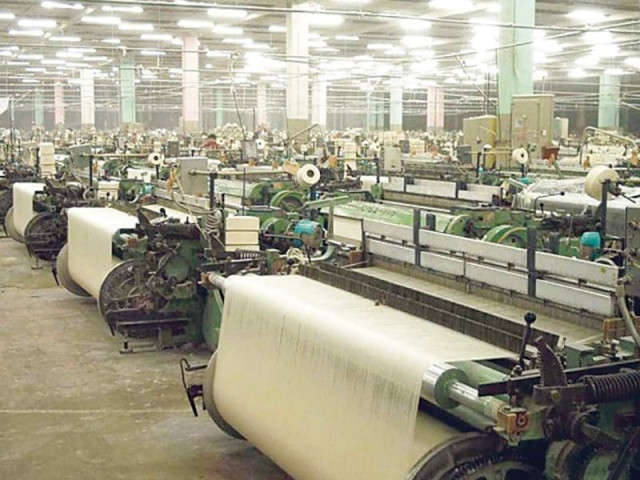Govt set to increase tax on textile products
Proposal said to have been cleared by PM, faces stiff opposition from textiles ministry.

Boosting revenue: Rs20b is likely to be generated by decision to increase tax rates on domestic sales of textile products. PHOTO: FILE
In a move akin to straying into a political mine field, Prime Minister Nawaz Sharif is said to have cleared a budget proposal to increase tax rates on domestic sales of textile products. The move is aimed at plugging revenue leakages and fetching Rs20 billion in taxes.
The premier has cleared the proposal to increase tax rates at yarn stage from 2% to 5% and at fabric stage from 3% to 5% from fiscal year 2014-15, finance ministry sources said. The rate at the garment stage will remain the same at 5%, they added.
The decision was taken to discourage tax evasion as 90% of textile production is cleared at yarn stage by paying only 2% tax, according to ministry sources. They said the purpose of rationalising the rates was to capture the evasion at the domestic stage.

The Federal Board of Revenue (FBR) wanted to introduce the standard 17% sales tax rate on textile goods in order to fetch revenue worth Rs65 billion. However, due to the sensitivity of the issue and the clout that the textile sector enjoys, the government decided not to completely withdraw the concessionary rates, the sources said.
The move, if cleared by parliament, may spark agitation in three major cities of the country – Karachi, Lahore and particularly Faisalabad. The proposal does not have the endorsement of the textiles ministry, according to sources.
The concessionary rates are regulated under a Statutory Regulatory Order (SRO) 1,125 – a legal instrument used to amend the laws. FBR wanted to withdraw the SRO, which would have resulted into the 17% sales tax rate. Sources said the SRO would not be withdrawn but amended to the extent of increasing the rates.
Under a condition put forth by the International Monetary Fund for its loan programme, Pakistan is bound to rationalise its tax regime which is tilted in favour of the wealthy segments of the society. FBR has worked out the cost of tax exemptions at Rs480 billion per annum and in the first phase, the government wants to withdraw around exemptions worth Rs125 billion.
Bone of contention
According to sources, the textiles ministry is vehemently opposed to the FBR move. It advised the finance minister to ‘zero-rate’ export-oriented sectors and collect the tax on textile products at reduced rates at the retail stage on domestic sales. The textiles ministry, the sources said, is against the idea of keeping factories as FBR’s collection agents.
According to the proposed arrangement, the entire textile production may be subject to 5% sales tax rate. Exporters will claim refunds after establishing the quantity of goods they exported while rest of the share will be charged at the rate of 5%.
Sources said that if the government decides to increase the rate to 5%, the exporters’ capital cost will augment. Besides, the nexus of corrupt officials of FBR and the industry will remain and the business of paying illegal refunds in return for bribes will continue.
The textiles ministry’s concern was that FBR was habitually treating refunds as its taxes and the proposal will further complicate the problems of the industries.
Tax on machinery imports
Sources said the proposal to withdraw 17% sales tax exemptions currently available on imports of all types of machinery under SRO 727 was also cleared by the prime minister. The textiles ministry’s view is that it will increase the cost of capital for industrialists.
Published in The Express Tribune, June 1st, 2014.



















COMMENTS
Comments are moderated and generally will be posted if they are on-topic and not abusive.
For more information, please see our Comments FAQ